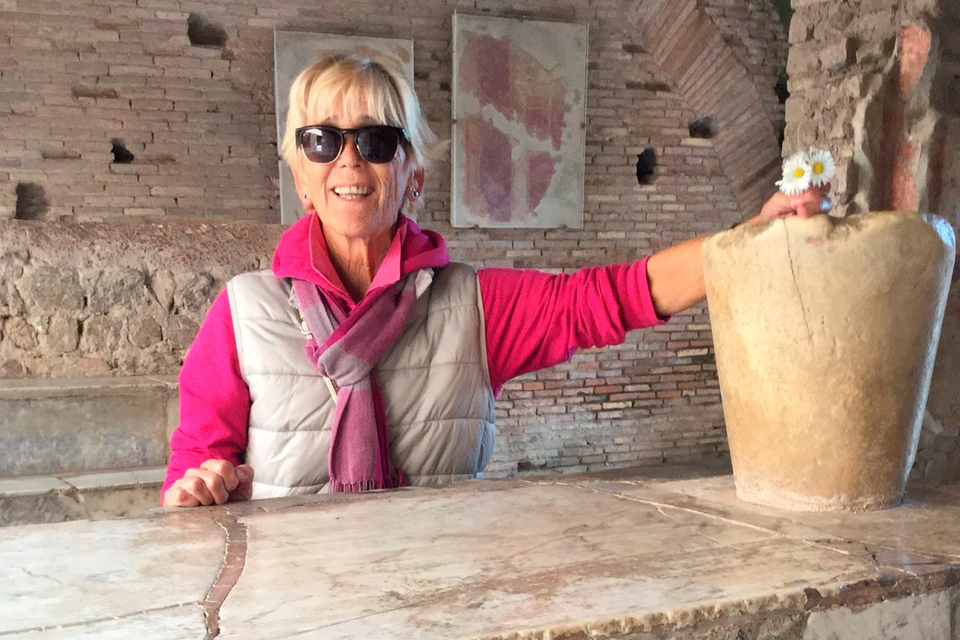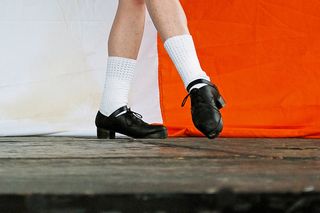Farewell to Anne O'Brien - the best Irish sportswoman that you never knew
Anne O'Brien was a star of ladies' football on the continent in the 1970s
When Robbie Keane became a father for the second time, three days before Ireland took on Germany at the Aviva Stadium last October, his assistant manager confirmed, in his own inimitable way, that the country's record-breaking striker would be available for the crucial match against the world champions.
In her apartment outside Rome, Anne O'Brien spluttered on her morning cappuccino, indignation growing, when she read Roy Keane's remark that the new father would face the Germans, unless he was breastfeeding.
What may have been a pithy response to an inquiry back in Ireland had been a reality for the Irishwoman living in Italy. O'Brien was a professional footballer and a mother who successfully combined both, playing for Modena during the early stages of her pregnancy and returning to the team just weeks after giving birth to her son Andrea. She brought her baby boy along to matches and breastfed him in the dressing room at half-time. Keane's remarks rankled.
A couple of weeks later, as she recounted the story over an espresso in her kitchen, her disgust having grown with the passing of time, she pointed out that three of the five league titles won during a long and gloriously successful career in Italy were after the birth of Andrea, and while she raised her young son alone.
Since her untimely death at the age of 60 in Rome last Monday, she has variously been described as 'Ireland's greatest footballer you never heard of' or 'best sportswoman that you never knew'. Given her achievements and talent, that shouldn't be.
Read more
Read More:
Her career didn't begin that way. When she signed for Stade de Reims in 1973, O'Brien's face and name were in the papers and she even made it onto the BBC news. The girl from Scudetti was living the impossible dream, the first woman from Ireland or Britain to sign for a professional European football team.
Reims were the Harlem Globetrotters of women's football in the 1970s, ruling French Ligue 1 like pre-Revolutionary aristocrats and anointing themselves world champions. They toured the world looking for greater challenges and, in 1973, they came to Ireland. The 17-year-old O'Brien had joined the Dublin All Stars and was picked on the Irish team to play Stade De Reims in Kilkenny.
Reims' charismatic manager Pierre Geoffroy was also a sportswriter with L'Union and went on to manage the French national team. So impressed was he by O'Brien that afternoon in Kilkenny, he asked her to join Stade for the rest of their tour around Ireland and resolved to ensure that would not be the extent of her career with the French behemoths.
O'Brien came from a footballing family: Johnny Giles and Jimmy Conway are relations, her nephew Ger is currently the captain of St Pat's, but allowing a teenage daughter to leave Ireland for life as a professional footballer in France over 40 years ago was not an easy decision for her mother to make. Others had tried to turn her daughter's athletic talent towards running, believing she had the ability to represent her country at middle distances, but the teenager was determined and stubborn - traits that carried her through her career at the top of women's football and in the two decades after she hung up her boots.
Read more
Read More:
Football was Anne's passion and her mother recognised this, giving Geoffroy permission to sign her daughter.
Life in France was tough; she missed her family and Inchicore, but she loved playing and training. Three league titles followed before she was offered the chance to move to Italy in 1977. The Italian women's game was at the peak of its popularity then - cultured, stylish and where the good money was. O'Brien signed for Lazio, moved to Rome, and instantly felt at home.
Romans are a lot like Dubliners, she used to say, and life in Rome suited her. The medieval streets with their sienna apartment buildings overhanging the cobbles, the zany traffic, the espresso bars were all to her taste. The Lazio team socialised in the Trastevere quarter of the city and, during one of her breakneck tours of the city last year, she recalled apartments where she lived, players she knew and parties they enjoyed.
Her career in Italy took in titles with Lazio, Trani, Reggiana and AC Milan as an elegant trequartista; the Italians revered a classical No 10 and she was one of the best to grace the game. After she finished playing, she moved into coaching and, with five Scudetti and two Coppa Italia trophies, O'Brien was in demand as a manager. She worked with Milan's youth team, managed Lazio and then took over the national under-17 team.
When the financial crash happened, money for investing in football, especially women's football, was nowhere to be found. Her passion for the game remained undimmed; listening to her animated analysis of matches in Italian and English while she watched them was a masterclass in tactical awareness. She was involved with local youth teams around her home in Fregene, the seaside town Romans flock to each August to escape the city heat. Sven Goran Eriksson's beachside home and the villa belonging to the haute couture Fendi family were on Anne's walk of fame through her home town of 20 years.
Read More:
The apartment she shared with her friend Sandra, a former goalkeeper from Verona, was less palatial than those wealthy residences. Her significant income from football was long gone and she worked as a cleaner and childminder, her young charges bringing her joy.
Fitness remained hugely important to her. She regularly consulted the pedometer on her phone to check how far she had walked each day or the distance she had covered on her bike. O'Brien began her day by reading the Irish papers on her phone while drinking her cappuccino. Home was always Ireland; she and Andrea returned to live in Dublin briefly after her mother died and she learned to drive a bus while working on a community employment scheme.
O'Brien would have loved more than four caps for her country, but bureaucracy and finance hindered that desire.
Opinionated, funny and with an iron will and a talent for the ages, Anne O'Brien had hoped to remind Ireland of her story while she lived.
The mother who breastfed her son while winning a Scudetto, will be belatedly recognised by the FAI at next month's international against Georgia - a tribute that should have been hers to enjoy while she lived.



























